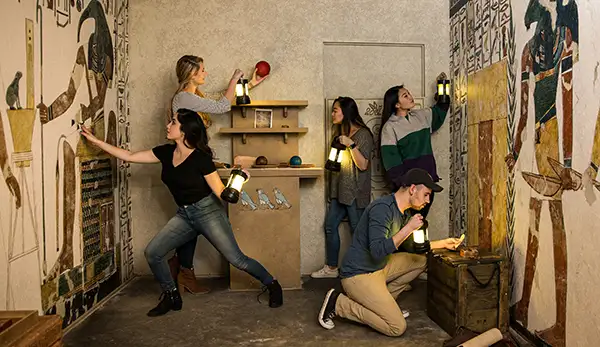Best Escape Room Experience-- Exciting Games and Puzzles for Teams
Best Escape Room Experience-- Exciting Games and Puzzles for Teams
Blog Article
Team Methods: How to Collaborate Efficiently in a Getaway Room
Groups should proactively listen to each participant's insights, designate roles that line up with specific strengths, and preserve normal check-ins to guarantee emphasis and prevent redundancy. By promoting an environment that values cohesion and flexibility, teams can dramatically increase their performance and success rates.
Establish Clear Communication

To assist in clear communication, it is crucial to assign a central factor of call for info dissemination. This function involves summing up searchings for and suggested approaches to guarantee everybody continues to be on the exact same page. Furthermore, taking on an organized approach to conversations can avoid disorderly exchanges. Short, concentrated updates from each group participant can keep the group notified without frustrating them with information - best escape room.

Assign Duties Tactically
While clear communication establishes the foundation for efficient synergy, assigning roles purposefully guarantees that each employee's strengths are used effectively. In a retreat room scenario, the time-sensitive and complicated nature of challenges requires an efficient technique to task delegation. By recognizing and leveraging private proficiencies, groups can optimize their analytical abilities and enhance general efficiency.
Someone with a keen eye for detail might stand out in discovering surprise things, while a sensible thinker might be much better matched to solving challenges. This duty frequently requires solid business and interpersonal abilities.
2nd, guarantee that duties are flexible and adaptable. As brand-new challenges arise, the group should be able to pivot, reapportioning tasks as required. This adaptability helps preserve energy and stops bottlenecks that could happen because of stiff function jobs.
Ultimately, a critical technique to function assignment not only takes full advantage of the staminas of each staff member however additionally promotes a cohesive setting, driving the team towards a successful escape.
Make Use Of Diverse Skills
Recognizing and taking advantage of the varied skills within your group can considerably elevate your efficiency in a getaway area. Each staff member brings one-of-a-kind toughness to the table, and efficiently leveraging these capabilities can speed up problem-solving and improve general performance. For instance, a team member with solid analytical abilities might excel at deciphering complicated codes or patterns, while another with eager observational capacities may swiftly find hidden ideas that others may overlook.
Reliable communication is vital to using these varied abilities. Urge staff member to voice their insights and concepts immediately, making sure that all possible services are considered. This inclusive technique fosters a dynamic atmosphere where creative thinking and important reasoning can prosper. Additionally, designating jobs that line up with each participant's strengths can prevent traffic jams and make certain that progression is constant.
Additionally, diversity in skills typically converts to variety in assuming designs, which is very useful in an escape space setting. While some obstacles may require rational thinking and accuracy, others could take advantage of creative and side reasoning. By identifying and leveraging this diversity, teams can resolve a wider range of obstacles better, thereby enhancing their opportunities of a successful retreat.
Manage Time Efficiently

First, allocate preliminary minutes for a quick survey of the area. Identify noticeable puzzles and split tasks based upon employee' strengths, making sure that no one is idle. Establish interior time checkpoints to examine progress periodically; for example, aim to have half the problems resolved by the mid-point of the game. This method can help keep the team concentrated and avoid time from escaping unnoticed.
Additionally, stay clear of one-track mind. If a puzzle is taking also long, rotate team members or go review on to another obstacle, returning later on with fresh viewpoints. Interaction is extremely important-- maintain every person upgraded on fixed problems and continuing to be jobs to prevent redundant initiatives.
Finally, utilize any type of hints or ideas moderately yet tactically - best escape room. Knowing when to request for aid can save beneficial time. By sticking to these time management concepts, groups can significantly improve their opportunities of a successful and enjoyable getaway room experience
Debrief and Reflect
Reflection is a crucial aspect of team advancement and improvement in the context of discover this info here getaway spaces. When the challenge is completed, whether efficiently or otherwise, it is important for the group to participate in an organized debriefing session. This procedure enables group members to evaluate their efficiency, determine staminas, and determine areas for improvement.
Start the debrief by discussing what went well. Highlight certain instances of reliable communication, analytic, and partnership. Recognizing these favorable behaviors strengthens them and urges their repeating in future obstacles.
Discuss minutes of complication, miscommunication, or ineffective methods. Motivate an open and positive discussion where group participants can share their perspectives without concern of objection.
Verdict
In verdict, successful cooperation in an escape area is based upon clear interaction, strategic duty tasks, the reliable utilization of varied abilities, and competent time management. Regular check-ins and structured debriefings are necessary for keeping focus and promoting constant renovation. By creating a cohesive and flexible team atmosphere, the possibility of successfully solving challenges and accomplishing the purpose of running away the space is substantially enhanced. This method not just makes sure success yet additionally promotes cumulative development and discovering.
Report this page